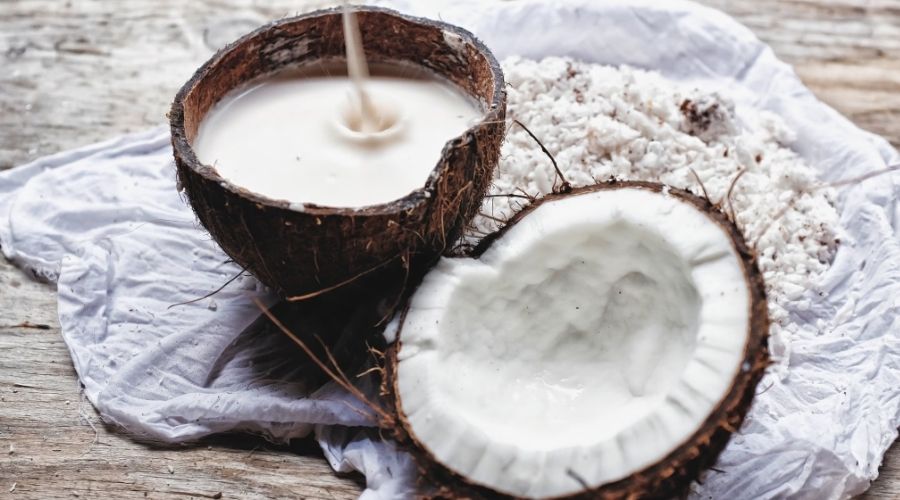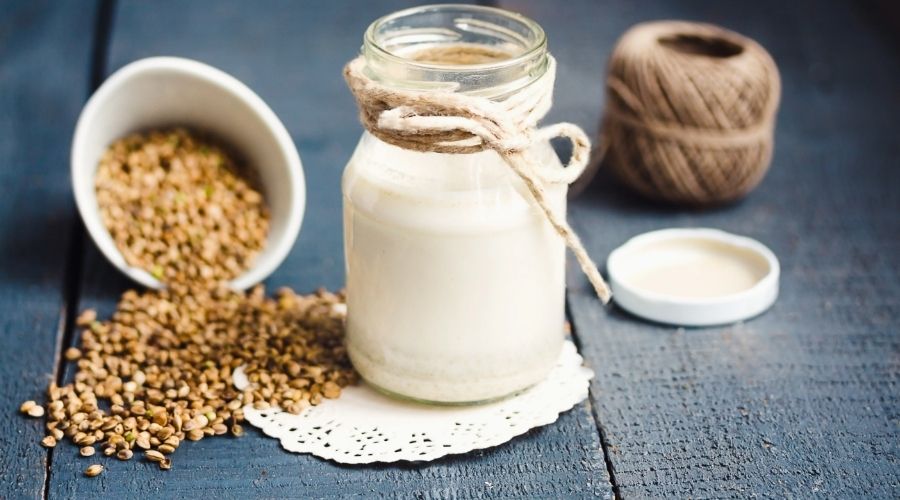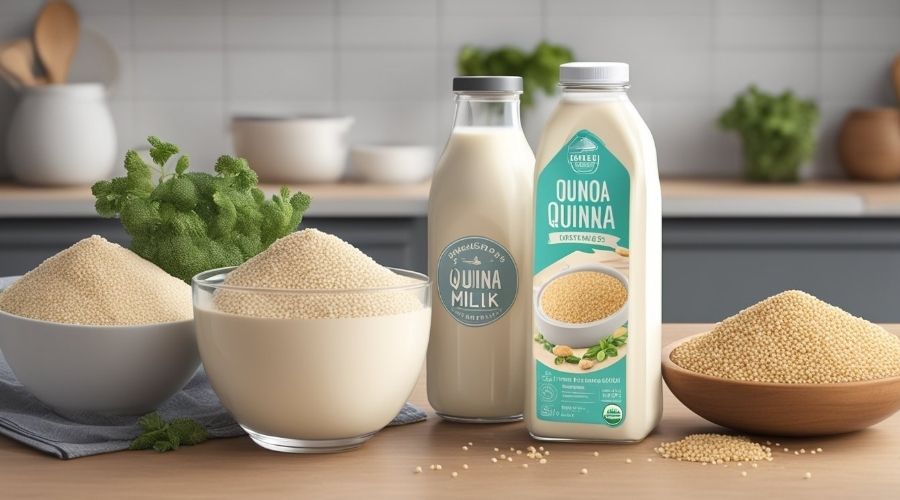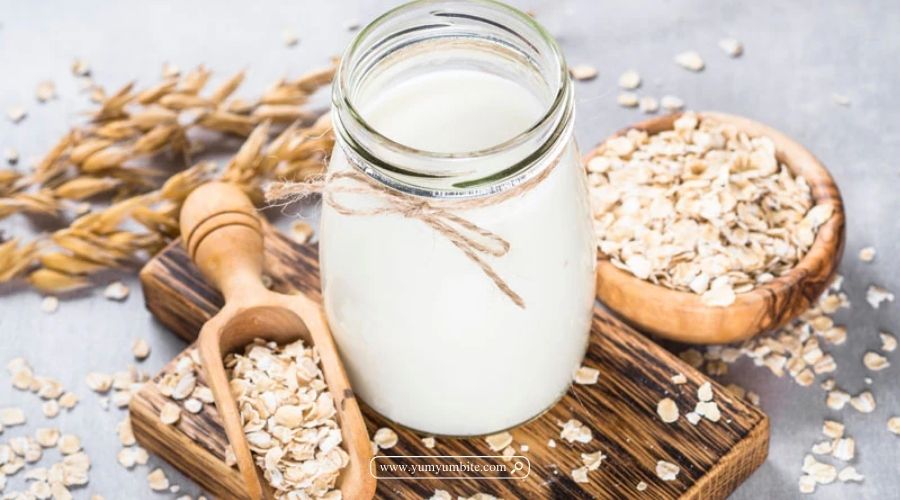Finding the right milk substitute for your oatmeal can make all the difference in both flavor and texture.
Whether you’re looking to make your oatmeal creamier, enhance its taste, or adapt to a dietary need, there are plenty of alternatives to regular milk that can suit your preferences.
From dairy-free options like almond milk and coconut milk to more unique choices like quinoa and flax milk, there’s a substitute for every oatmeal lover.
In this guide, we’ll explore 12+ oatmeal milk substitutes that cater to different tastes, dietary requirements, and health benefits, making your morning bowl even more enjoyable.
12+ Delicious Oatmeal Milk Substitutes for Vegans, Paleo, and Dairy-Free Diets
Whether you’re vegan, lactose intolerant, or just experimenting with different tastes, these 12+ milk substitutes offer a range of textures, flavors, and health benefits to explore.
From the creamy richness of coconut and cashew milk to the protein-packed benefits of pea and soy milk, the options are endless.
Try out different substitutes to find your perfect match and enjoy a healthier, more flavorful oatmeal experience every morning. Making the switch to a milk alternative has never been easier—or tastier.
Almond Milk
Almond milk is a popular substitute for regular milk in oatmeal due to its light, nutty flavor and low calorie content. This dairy-free option is perfect for those who are lactose intolerant or following a plant-based diet. Its naturally sweet taste complements oatmeal well, adding a subtle richness to the dish.
However, almond milk is thinner than cow’s milk, so it may not produce the same creamy texture.
To compensate, you can add a little more oats or reduce the amount of liquid slightly. Almond milk works well in both sweet and savory oatmeal recipes, though some may find it unsuitable if they have nut allergies.
Coconut Milk

Coconut milk offers a rich, tropical flavor that pairs well with oatmeal, especially in recipes with fruits like pineapple, mango, or banana.
This substitute is creamier than almond milk and adds a luscious texture to your oatmeal.
It’s also a great choice for those looking for dairy-free options, but due to its higher fat content, coconut milk is more calorie-dense, so it’s best to use in moderation if you’re watching your calorie intake.
Coconut milk is suitable for more indulgent oatmeal recipes or tropical-flavored bowls, but the strong flavor may overpower more delicate ingredients.
Soy Milk
Soy milk is an excellent all-purpose milk substitute for oatmeal. It closely mimics the creaminess and thickness of cow’s milk, making it a satisfying swap for those with lactose intolerance or those who prefer plant-based diets.
It’s also higher in protein compared to other milk alternatives, which can make your oatmeal more filling.
However, soy milk has a distinct flavor that might not appeal to everyone, so it’s best to try it in oatmeal recipes that already have stronger flavors, such as those with spices like cinnamon or nutmeg. Be cautious if you have a soy allergy.
Also Read: 12+ Best Substitutes for Coconut Milk in Curry Recipes!
Oat Milk
Oat milk is a natural substitute for oatmeal, as it enhances the grain’s natural flavor without overpowering it. It’s creamy, slightly sweet, and blends seamlessly with the texture of oats.
Since it’s derived from oats, this milk is also ideal for those seeking a dairy-free, nut-free, and soy-free option.
However, oat milk can be higher in carbohydrates, so it may not be suitable for those on low-carb diets.
It’s best suited for traditional oatmeal recipes, especially those that lean toward a naturally sweet flavor profile.
Rice Milk
Rice milk is a mild and slightly sweet substitute for cow’s milk in oatmeal. It’s naturally thinner and less creamy than other alternatives, but it’s a great option for those with allergies to soy, nuts, or dairy.
The neutral flavor allows the taste of other oatmeal ingredients, such as fruits or spices, to shine through.
However, rice milk is lower in protein and higher in carbohydrates compared to other milk substitutes, so it may not be as filling. It works well in lighter oatmeal recipes, such as those with berries or citrus flavors.
Cashew Milk
Cashew milk offers a creamy, slightly nutty flavor that complements oatmeal beautifully. It’s similar to almond milk but tends to be creamier, making it a good option for those who enjoy a rich texture in their oatmeal.
Cashew milk is also low in calories and naturally dairy-free, suitable for those on a vegan or lactose-free diet.
However, like almond milk, it’s important to note the potential allergen risk for those with nut allergies. Cashew milk pairs well with decadent oatmeal recipes involving chocolate, cinnamon, or warm spices.
Hemp Milk

Hemp milk is a nutritious and unique milk substitute for oatmeal. It has a slightly nutty, earthy flavor and is packed with omega-3 fatty acids, which makes it a healthier option for those looking to increase their intake of good fats.
Hemp milk is also naturally dairy-free, soy-free, and nut-free, making it suitable for many dietary restrictions.
However, the taste of hemp milk can be strong, so it’s best used in oatmeal recipes with bold flavors, such as cacao, peanut butter, or spices. Be mindful of the flavor if you prefer a more neutral oatmeal base.
Macadamia Milk
Macadamia milk is a luxurious substitute that offers a creamy and smooth texture, perfect for making oatmeal richer and more indulgent.
The subtle, buttery flavor of macadamia milk enhances oatmeal without being overpowering, making it an excellent option for those who enjoy a silky consistency.
It’s dairy-free and low in carbohydrates, but like other nut-based milks, it’s higher in fats.
Macadamia milk is ideal for gourmet oatmeal recipes, particularly those featuring ingredients like maple syrup, vanilla, or roasted fruits. However, it may not be suitable for those with nut allergies.
Also Read: 12+ Delicious Celery Seasoning Substitutes for Every Recipe
Flax Milk
Flax milk is a nutrient-rich, plant-based option that makes for a healthy oatmeal substitute.
Made from flaxseeds, it provides a good dose of omega-3 fatty acids, which can be beneficial for heart health.
Flax milk has a light, slightly earthy flavor that won’t overpower your oatmeal, and it tends to be thinner in texture.
This milk alternative is ideal for those with dairy, soy, or nut allergies. However, its lower protein content may leave you feeling less full, so consider adding protein-rich toppings like nuts or seeds.
Flax milk is best suited for simple oatmeal recipes with fruits and mild spices.
Quinoa Milk

Quinoa milk is a less common but highly nutritious substitute for regular milk in oatmeal. It’s made from quinoa, a high-protein grain, which makes it an excellent option for those looking to add a bit more protein to their meal.
Quinoa milk has a slightly nutty and earthy flavor that can complement heartier oatmeal recipes, especially those featuring nuts, seeds, or cinnamon.
One thing to note is that it has a thinner consistency, so it may not deliver the creaminess of other milk alternatives. It’s a great choice for those following gluten-free diets or looking for a protein boost.
Pea Milk
Pea milk is a plant-based milk substitute made from yellow peas, and it’s surprisingly creamy and high in protein.
This milk works well in oatmeal, providing a thick, satisfying texture while offering a neutral flavor that won’t interfere with other ingredients.
Pea milk is an excellent option for those who need a dairy-free, nut-free, and soy-free alternative but still want a protein-rich option.
However, some may find the slightly legume-like flavor a bit different, so it’s best used in oatmeal recipes with bold flavors like chocolate, spices, or berries.
Hazelnut Milk
Hazelnut milk adds a rich, nutty flavor to oatmeal, making it a unique and indulgent substitute. Its naturally sweet, roasted taste pairs well with chocolate, fruits, or spice-based oatmeal recipes.
Hazelnut milk is dairy-free and lower in calories compared to cow’s milk, but it does contain less protein, so it might not be as filling unless supplemented with other protein-rich ingredients.
This milk works best in dessert-style oatmeal recipes, such as those involving cocoa powder or sweet toppings. However, it’s not suitable for people with nut allergies.
Also Read: 8+ Flavorful Italian Seasoning Substitutes You Can Make at Home!
Homemade Oat Milk Substitute Recipe
Making oat milk at home is an easy and cost-effective way to enjoy a dairy-free, plant-based milk substitute that’s perfect for everything from oatmeal to smoothies.
This homemade version is not only free from preservatives and added sugars but also allows you to customize the flavor and thickness to your preference.
With just a few simple ingredients and minimal prep time, you’ll have a creamy, nutritious oat milk ready to use in all your favorite recipes.
Plus, it’s naturally gluten-free (if using certified gluten-free oats) and can be made in large batches to store for later use.
Ingredients:
- 1 cup rolled oats (certified gluten-free if needed)
- 4 cups filtered water
- 1 teaspoon vanilla extract (optional for flavor)
- 1 tablespoon maple syrup or sweetener of choice (optional)
- Pinch of salt (optional for taste balance)
Instructions:
- Prepare the oats: Start by soaking the rolled oats in water for about 15-30 minutes. Soaking helps soften the oats and makes them easier to blend, resulting in a smoother milk consistency. After soaking, drain and rinse the oats well to remove any residual starch, which can make the milk slimy.
- Blend the oats: Add the soaked and rinsed oats to a blender along with 4 cups of filtered water. For added flavor, include the vanilla extract and sweetener, if desired. Blend on high for 30-40 seconds until the mixture looks creamy and well combined. Be careful not to over-blend, as this can make the milk too thick.
- Strain the milk: To separate the liquid from the oat pulp, strain the mixture through a nut milk bag, fine mesh strainer, or clean cheesecloth. Gently squeeze out as much liquid as possible. This step is crucial for achieving a smooth, pulp-free oat milk.
- Taste and adjust: After straining, taste your homemade oat milk. If you prefer it sweeter, add more sweetener to your liking. For those who want a creamier consistency, you can adjust by adding more oats or less water in future batches.
- Store: Pour the oat milk into an airtight container or glass bottle and store it in the refrigerator for up to 4-5 days. Shake well before each use, as homemade oat milk tends to separate naturally over time.
Homemade oat milk is a versatile and affordable alternative to store-bought versions. Not only can you customize the flavor and texture to suit your preferences, but you also know exactly what goes into it, making it a healthier choice.
Whether you’re using it in your morning oatmeal, adding it to coffee, or blending it into smoothies, this easy recipe gives you a fresh, creamy oat milk option that fits perfectly into a plant-based or dairy-free lifestyle.
Plus, it’s sustainable and eliminates the need for unnecessary packaging.
Enjoy the convenience of having this homemade milk substitute readily available whenever you need it!
What is the best substitute for milk in oatmeal?
The best substitute for milk in oatmeal depends on your dietary preferences and flavor profile.
Popular options include almond milk for a light, nutty flavor, coconut milk for a rich and creamy texture, and oat milk for a naturally sweet, complementary taste.
Soy milk is ideal if you’re looking for a protein-rich alternative, while rice or flax milk offers options for those with nut or dairy allergies.
Can I use water instead of milk in oatmeal?
Yes, you can use water instead of milk to cook oatmeal. While using water will result in a less creamy texture compared to milk or milk substitutes, it can be a lighter option, especially if you’re looking to reduce calories or follow a specific dietary plan.
For added creaminess, you can stir in a bit of plant-based butter or a splash of milk substitute after cooking.
Is oat milk a good substitute for regular milk in oatmeal?
Oat milk is an excellent substitute for regular milk in oatmeal because it enhances the natural oat flavor and provides a creamy consistency.
Since oat milk is made from the same base ingredient, it blends seamlessly with the texture of oatmeal and is naturally dairy-free. It’s also a great option for those with nut or soy allergies, though it’s slightly higher in carbohydrates than other milk alternatives.
How do different milk substitutes affect the flavor of oatmeal?
Different milk substitutes bring unique flavors to oatmeal. Almond milk adds a light, nutty taste, while coconut milk creates a richer, tropical flavor.
Soy milk has a neutral taste with a thicker consistency, while oat milk offers a naturally sweet, creamy flavor that enhances the oat base.
Hazelnut milk brings a roasted, nutty flavor, and rice milk provides a mild, slightly sweet taste. Choosing the right one depends on your preferred flavor profile and recipe.
Can I make a homemade milk substitute for oatmeal?
Yes, you can easily make homemade milk substitutes for oatmeal. Oat milk, for example, can be made by blending rolled oats with water and straining the mixture.
You can also make almond, cashew, or other nut milks using a similar process by blending soaked nuts with water and straining the liquid.
Homemade milk substitutes are free from preservatives and can be customized with flavors like vanilla or sweeteners like maple syrup to match your taste preferences.
References
- https://www.reddit.com/r/Cooking/comments/t2i3qx/how_to_make_oatmeal_creamy_without_milk/
- https://www.quora.com/What-s-the-best-substitute-for-milk-and-water-for-oatmeal
- https://www.onegreenplanet.org/vegan-food/how-to-make-your-oatmeal-creamier-without-milk/
- https://ournourishingtable.com/overnight-oats-without-milk-four-ways/
- https://www.pacificfoods.com/blog/can-you-substitute-oat-milk-for-milk/


